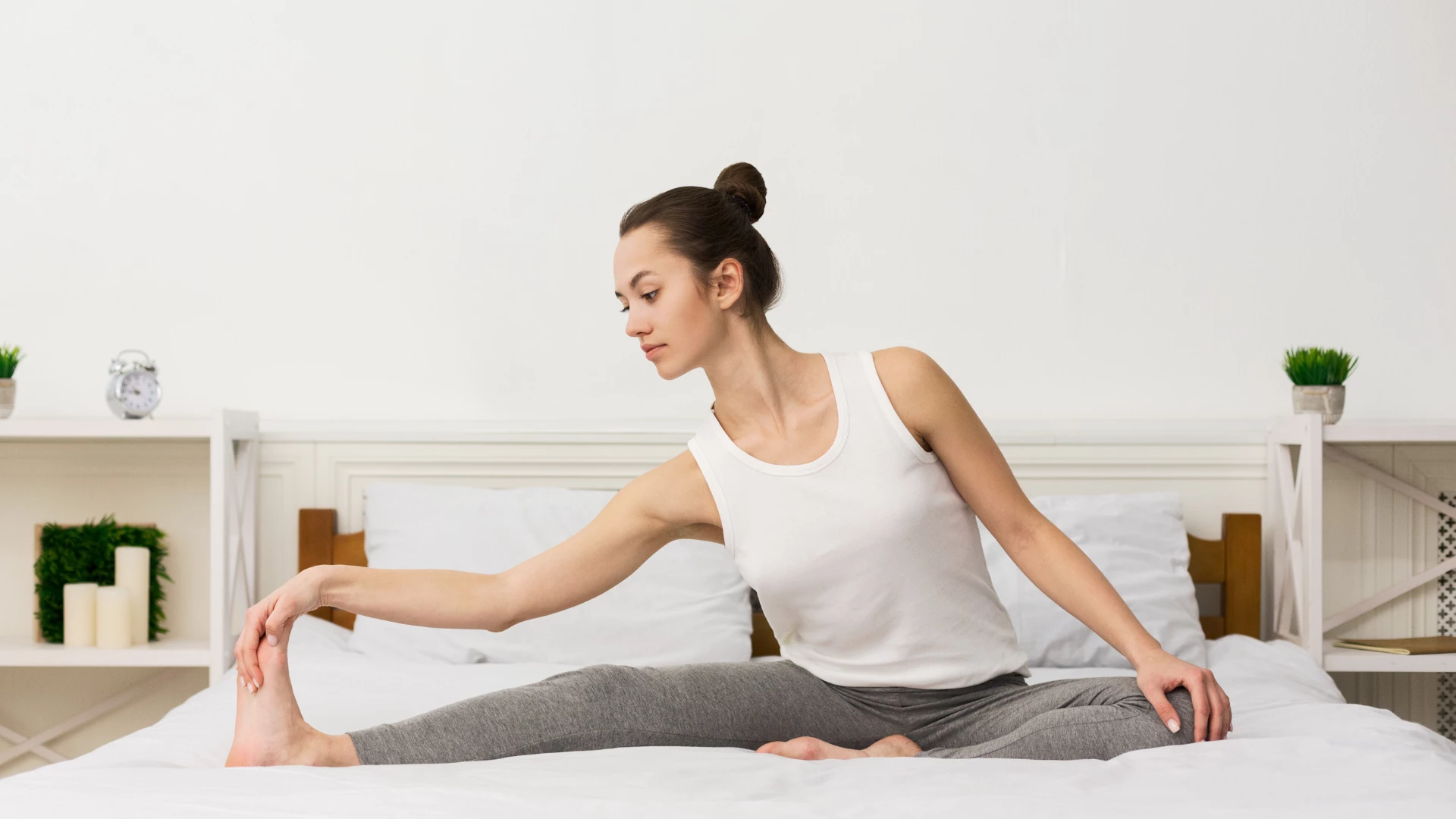7 Tips to Help You Wake Up Early

Article At A Glance
If you genuinely want to start waking up early but have been struggling to do so, then you’re at the right place. In this article, I will share simple, easy-to-follow, evidence-based tips that will help you modify your internal clock so you can wake up early every day.
So let’s begin right away by first understanding the mechanism that helps us wake up early or sleep on time: the circadian rhythm.
What is the Circadian Rhythm?
The times we wake up and go to sleep are not arbitrary. In fact, it is governed by our internal body clock—the circadian rhythm. Most living beings on the planet have this internal 24-hr clock in the brain that governs many functions. The circadian rhythm controls the release of certain hormones and even the time you sleep or wake up. When it comes to sleep, two hormones that influence this rhythm are melatonin and cortisol. Melatonin makes you sleepy, and cortisol keeps you awake.
When the circadian rhythm works well, your cortisol levels and body temperature will naturally rise in the morning to help you wake up. Think of cortisol as the body’s natural alarm clock, which buzzes at the right time every day. Likewise, your melatonin levels naturally rise in the evening, and your body temperature drops, making you drowsy and ready for bed. Think of melatonin as your body’s natural sleeping pill.
When you want to change what time you wake up and sleep, you’re essentially trying to change the timing of these hormones. So, let’s dive into the actual techniques to shift your circadian rhythm so you can wake up early
How to Wake Up Early: 3 Morning Rituals
1. Get Some Sunlight Soon After You Wake Up

Every cell in your body needs information about light to function properly. And the only way to provide this information is through your eyes, by stepping out in sunlight. Therefore, aim for at least 2 to 10 minutes of sun exposure when you wake up. On a cloudy day, you may need more time outside than on a bright sunny day. You need to get direct sunlight outdoors and not through sunglasses or window panes (prescription lenses are fine). Also, you don’t have to look directly at the bright sun, which can damage the eyes. Just being outdoors is enough.
This is effective even if you wake up way past sunrise. Just make it a point to get some sunshine whenever you wake up. Usual sun protection protocols should be followed to keep your eyes and skin safe from damage.
Morning sun exposure is the most powerful way to influence your circadian rhythm. There are other ways, too, like the timing of food intake or exercise, but nothing compares to the impact of natural light. It will help you wake up early.
2. Exercise Within 30 Minutes of Waking Up

Exercising increases your body temperature and stimulates the release of cortisol. It also helps you get deeper and better quality sleep.
How does this work? Your body temperature is closely linked to the circadian rhythm. Body temperature starts rising in the morning as you wake up until around 4:00 to 6:00 pm. After that, the body starts cooling down to prepare you for sleep. Exercising releases cortisol. Regularly exercising at the same time every day will train the body to release this cortisol around the same time every day. This will sync your circadian rhythm to an earlier wake-up time.
For the same reasons exercising just before sleeping will leave you feeling wide awake because that is the time for cortisol to decline and melatonin to increase. Your body temperature also increases after exercise, and can remain elevated for one to two hours after physical activity. Therefore, if you do want to exercise in the evening, it’s better to do so a few hours before bedtime.
Typically, body temperature starts rising around 6:00 am. By exercising in the morning, you increase your body temperature and trigger this mechanism, which helps you advance your circadian rhythm to wake up early. Additionally, being disciplined about our time of exercise also conditions the brain to release hormones that prepare you to exercise at the same time every day. So, you have to rely less on motivation to meet your daily activity levels.
3. Take a Cold Shower

Cold showers increase circulation and heart rate, which helps you feel more awake and invigorated immediately. However, that’s not all. This rise in temperature also has the power to advance your circadian clock. This means taking a cold shower in the morning will make you sleepy earlier than usual at night. This will make it easy to get up early the next day.
This is because cold showers also help you increase core body temperature. This might sound counterintuitive, as when you take a cold bath, the body feels cold. However, it’s the extremities and skin surface that become cold, and blood circulation indeed reduces there. But your core gets warmer as your body cannot release heat through the skin. Due to this reduced heat loss, you will soon feel very hot again, and increased blood circulation will help you release the excess heat through the skin. So, yes, after a few initial minutes of discomfort, a cold shower will make you feel warm, and a warm shower can help you feel comfortably cool.
The body needs to be warm when it wakes up and cold when it needs to sleep. Our circadian rhythm governs this natural temperature change in our body throughout the day. By taking a cold shower, we develop a pattern of warming the body in the morning. This helps you reinforce the natural rhythm.
What about taking a cold shower at night? There’s a lot of conflicting research around this, and it was a popular trend a while back. It might be beneficial for athletes, but in general, cold showers at night aren’t considered very helpful. However, feel free to try and see what works for you.
How to Wake Up Early: 4 Evening Rituals
Now let’s look at some evening rituals that can help you wake up early the next day.
4. Watch the Sunset

While morning sunlight is great for waking up early, evening sunlight is also useful for good sleep. It indicates to the body that the day is ending and helps you sync your clock to the time of day. Watching the sunset can even help counterbalance the impact of blue light from late-night mobile or computer screens. So, if you can’t avoid working late in the night, then you should definitely make it a point to be outdoors at sunset or one hour before sunset.
Sunlight therapy is good for sleep and effective for those with ADHD.
5. Switch to Warm Light
Three Japanese scientists won the Nobel Prize for discovering LED lights. While they are a remarkable achievement and are highly energy efficient, they can disrupt our sleep cycle because they emit blue light. The receptors in our eyes communicating daytime to the brain are most sensitive to this blue light. In fact, the evening blue light exposure is more disruptive than the warm yellow light of old bulbs.
Since LEDs are very powerful at emitting this blue light, it’s better to switch to warm yellow lights in the evening. It’s also useful to dim the lights in the evening to mirror the loss of light in the environment.
6. Avoid Overhead Light—Use Floor Lamps
The light-sensitive cells in our eyes are more sensitive to overhead sunlight. Therefore, if they detect the overhead lights in your environment, they may give incorrect information to the brain and delay your sleep. Instead, keep dimmable, warm yellow light lamps on the floor or desk. Our eyes are less sensitive to lights below eye level. It’s good to start minimizing overhead lights after around 4:00 pm.

7. Avoid Bright Light Between 11:00 pm and 4:00 am
This is important not just for sleep but also for our mental health. Bright blue light exposure at this time is associated with lower dopamine levels, which impacts our mood as well as our ability to learn and function optimally.
Remember that dopamine is the motivation hormone. Less of it means less motivation and drive or zest for life. Every hour of sleep before midnight is worth two after midnight. Ayurveda suggests that one must sleep before 11:00 pm when the pitta dosha hour begins.
How to Wake Up Early: Align with Nature

I hope you’ve gathered by now that all of these evidence-based findings are ultimately giving us a simple message: align yourself with nature as much as you can for greater health and well-being. Age-old wisdom of praying to the sun as it rises, having a set of morning rituals to start the day, and finishing our meals before sunset has now also found scientific basis.
So, remember to get your morning dose of sunlight, get some exercise, and follow it up with a relaxing shower. When the day ends, start dimming overhead lights and switch to more warm mood lighting, preferably via floor or desk lamps. And if you can watch the sunset over the horizon, step outside, or stand by the window, allowing some soothing evening light to wash over you.
On that note, I hope you have a deep, restful sleep and wake up refreshed and charged up to take on the day!
Also, read...
Study: Yoga Can Help Foster Greater Mind-Body Integration – The Four Stages of Body Awareness
Want to Feel Better? Just Breathe – The Power of Bhramari Pranayama (Humming Bee’s Breath)
The Health Benefits of Multi-Day and Intermittent Fasting Part 2
Related courses

Namita Piparaiya is a Yoga and Ayurveda Lifestyle Specialist and the founder of Yoganama. A former corporate executive, she spent over a decade, from management trainee to business head, with leading MNCs including Citibank, Aviva, and Generali before finding her true calling in Yoga.
As part of her wellness journey, she has completed over 700 hours of Yoga Alliance certified training in Hatha Yoga. She has also studied Pranayama, Ayurveda, Yoga Philosophy, and Indian scriptures from some of the most reputed institutions and teachers in India and abroad. These include courses and workshops across Oxford Centre for Hindu Studies, Cambridge Summer School, eCornell, The Himalayan Institute (USA), David Frawley’s American Institute of Vedic Studies, Chinmaya Mission, India Yoga, Paulie Zink (founder of Yin Yoga), and BNS Iyengar (Mysore). Her approach is, therefore, holistic and unique, bringing together all her experiences to build a strong connection between the body, breath, mind, and one’s inherent constitution and nature.
Namita is acclaimed as one of the leading Yoga influencers in India, with a very engaged and dedicated following across social media platforms. She has been featured and published by India Today, Statesman, The Week, Business World, Elephant Journal, Cosmopolitan, Grazia, and other leading publications in India and abroad.
Namita is an Honours graduate in Mathematics from Delhi University and has an MBA from Symbiosis (SCMHRD), Pune. An avid traveler, she visited 53 cities across 15 countries in 2019, exploring the philosophies, cuisines, and customs of different cultures. She lives in Mumbai, India.



